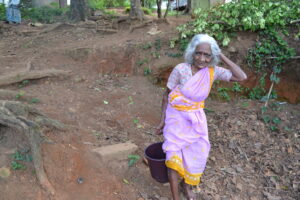Emergency activities in Sri Lanka
State: Completed | Number of beneficiaries: 540 families including 800 children
Project duration: 2022 / 6 months
Place: Plantation regions in the center of the country: Nuwara Eliya and Batticaloa, and Colombo the capital
Project financed under a framework agreement by the Ministry of Foreign Affairs of the Grand Duchy of Luxembourg

Local partners
Mencafep, Palm, Life for all Foundation
Context
Sri Lanka is experiencing its worst economic crisis since independence, amplified by the global economic context affected by the coronavirus pandemic, climate change which is destabilizing food markets, and the war in Ukraine which is fueling very high inflation (+ 54% in March, up to 200% for rice or fuel). In default of payment, Sri Lanka can no longer borrow to cover a colossal debt (51 billion dollars). The population has endured months of power outages and severe shortages of food, fuel and medicine, sparking weeks of mostly peaceful anti-government protests. The president’s loyalists mobilized against the protesters, causing 7 deaths and more than 200 injuries. The police imposed a curfew and the president declared a state of emergency.

The mission
PADEM proposes to support its two Sri Lankan partners working in the tea plantations of the central region, and a partner in Colombo, to set up actions at two levels:
- Immediate actions of direct support to vulnerable families for access to food and basic health services, while ensuring the continuity of children’s education
- Actions supporting the economic resilience of these families over the medium term, through the improvement of family gardens, the restoration of livelihoods and the diversification of income-generating activities that are part of the local economy.
Activities
- Allow at least 800 children at risk to have access to food, hygiene, care and education: distribution of food, hygiene items and medicines, support for the schooling of children (50% girls/boys) with the distribution of school supplies and the payment of other school-related costs
- Enable at least more than 300 families among those identified to improve their ability to produce part of their food and increase their income: support for families with seeds, seedlings, agricultural inputs for organic market gardening in the allotment gardens and support for the restoration of livelihoods through the provision of tools and equipment, so as to preserve their productive capital and ensure their autonomy, support for the diversification of income-generating activities through micro initiatives-companies
- Monitor the situation of children at risk in partnership with social services: monitoring child protection as a cross-cutting activity, continuing to mobilize community protection networks and closely monitor the situation of children, in connection with State services, and support for the operation (food, hygiene, health care, etc.) of 6 socio-educational centers welcoming 150 children with disabilities
Beneficiaries
540 families including 800 children
